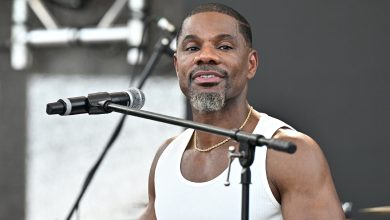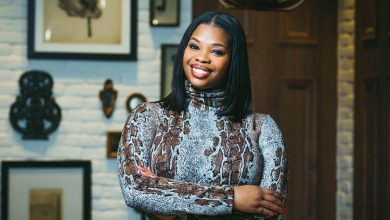To Be A ‘Shark’ Like Daymond John, He Says You Need To Understand That Attention Is The New Currency


Daymond John says his mother is the ultimate entrepreneur.
Lessons From His Mother
The entrepreneur and “Shark Tank” investor hails from the Hollis neighborhood of Queens, NY, where he was raised by his mother, Margot. When John was 10, she became a single parent and did everything she could to ensure his success. ABC Network reports that his mother worked part-time as a flight attendant and in other jobs to keep them afloat.
“I always say that first of all, a mother is the ultimate entrepreneur, but an African-American mother who was a single mother is the ultimate entrepreneur,” John said during an interview with AFROTECH™ held during the Clover x Shark Tank Summit Sept. 28-30, in Las Vegas.
“She’s gonna figure that sh-t out. And so Mom figured out how to. She always had common sense,” John continued.
He also shed light on the advice he received from her about everything from buying meat from the better part of town down to the simplicity of listening to your gut.
“She told me to trust my gut. Before I understood, she used to always say, ‘You don’t gotta explain to anybody why your gut is telling you something. That’s nobody else’s business. I don’t care how good it may look on paper… Trust your gut, ’cause that’s God’s direct line to your belly button,’” he recalled.
FUBU
This mantra likely played an integral role in John’s unconventional decisions, including not attending college. Instead, he sold and flipped cars before taking a job at Red Lobster when he was 23, Inc. reports. In 1992, he launched FUBU (For Us, By Us) — a streetwear brand that paid homage to Hip-Hop culture — alongside Carlton Brown, Keith Perrin, and J. Alexander Martin. Its product launch centered on hats initially.
John’s mother took a $100,000 loan out on her mortgage to invest in the business, after 27 banks rejected his application, as AFROTECH™ previously reported. John’s LinkedIn notes that the funding helped to turn half the home into a factory.
Growing the business came with its hardships. John described FUBU’s early days as: “Having 10 T-shirts and going to every single video set I could for two years. Putting it on rappers and then taking it back from them and getting kicked off of 18 of those 40 videos that I went to. Getting it on 22 video sets, mortgaging my house, sleeping in sleeping bags next to my sewing machine while working Red Lobster.”
Despite it all, his grit paid off. By 1998, the company generated more than $350 million in sales, per another Inc. article. Today, its lifetime sales has crossed over $6 billion, Entrepreneur reports. FUBU has also expanded globally, in Europe and Asia. The company’s bottom line took a hit in the U.S. due to a higher volume of inventory available. To keep demand up, FUBU made the decision to expand to international markets in the 2000s, information on John’s website reads.
“FUBU Manila is probably our biggest market, and it’s still a very Hip-Hop brand,” he mentioned in the AFROTECH™ interview.
John added that he could position FUBU as one of the most talked about brands today, but he admits his focus is on partnerships and investing in founders.
“I like people to discover it … I’m also someone who’s a little bit of a scatterbrain. I’m onto other things because I have a job here. The 10 entrepreneurs that I’ll invest in this year, they’re depending a lot on me,” John said.
“I try to look for great partners like Actively Black. I do a lot with them because I know they are the new FUBU. I look to do as many collaborations with other companies that I think are servicing the community more these days,” he continued.
Greatest Creative Risk
The story of FUBU started with a bold move that ultimately paid off, though it wasn’t what John considered his riskiest move. Instead it was his early 2000s investment of $6 million in the women’s fashion label, Heatherette, The Wall Street Journal confirms.
“I thought that I could apply my same beliefs on how I did it with my business onto a different business model, and it didn’t work and I let my Heatherette guys down,” John admitted to AFROTECH™.
“It didn’t do that well because my ego was in the way. ‘Well, it’s just cookie cutter. Here’s what you do.’ Consumers can see through cookie cutter. They know these brands and you can’t apply that crap to this one,” John added.
How To Think Like A ‘Shark’
As for what’s ahead for John, he’s returned as a judge on “Shark Tank” for its 17th season. He has reportedly invested nearly $9 million in businesses from the show, per Entrepreneur. As AFROTECH™ previously reported, this includes Philadelphia-based streetwear apparel brand Spergo. Its founder, 15-year-old Trey Brown, landed a $300,000 deal in exchange for a 20% stake.
As for what it takes to have a “Shark” mindset, John suggested to AFROTECH™ that venture capitalists and investors consider, “What is the earned media and the earned attention that the founders can find around their brand? Because that’s where the black hole is in investing. So what is the attention? Attention is the new currency today.”




